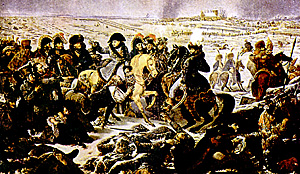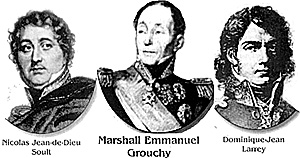
The Russians had reacted fast to Davout's outflanking attack. Kamenski had already been sent to support Baggovut and Barclay, and the Russian Reserve Artillery was on the move as well. Davout, at 37 prematurely bald, and dependant in battle on his specially made combat spectacles, may not have looked quite the Alexander, but no one disputed his reputation as the coolest and most ruthless of Napoleon's Marshals. With his second division only just forming up from column of march, and the third not yet in sight, he made Friant's division stand north of Serpallen while he prepared his attack.
Gros' 1808 Battle of Eylau, officially approved by Napoleon.
North of Eylau, meanwhile, the French and Russian artillery continued their terrible duel over open sights at 800 yards. Though the Russian lines were more exposed, and suffered cruelly at the hands of the French gunners. Napoleon's artillery could not match the numbers and calibre of their opponents' pieces.
 Soult' s men had already staged an attack to relieve their agony, but had been quickly forced back to their start-line. Now, they were under more pressure than ever. The regiments were fading visibly, and the surgeons had more work than they could cope with. Something must be done to relieve the pressure on the left. As the icy snow-squalls increased in intensity, and lashed at the faces of the French Infantry, Napoleon ordered Augereau forwar on the right to gain precious time.
Soult' s men had already staged an attack to relieve their agony, but had been quickly forced back to their start-line. Now, they were under more pressure than ever. The regiments were fading visibly, and the surgeons had more work than they could cope with. Something must be done to relieve the pressure on the left. As the icy snow-squalls increased in intensity, and lashed at the faces of the French Infantry, Napoleon ordered Augereau forwar on the right to gain precious time.
The Marshal, face wrapped in a scarf, swung painfully in the saddle and screwed up his eyes to discern the Russian lines opposite. After the briefest of conversations with his two divisional commanders, no one was under any illusions about the chances of success. A flurry of activity from the mounted officers, a cacophony of shouted commands along the line. The two divisions, deployed for action, suddenly rolled forward to the the beat of the drum and marched into Hell.
Napoleon watched them vanish into the teeth of a fierce blizzard which now swept across the battlefield. He was praying that they would be able both to distract the Russians from Soult, and support Davout's flank attack, St. Hillaire's division, too, was ordered forward, to act as a link between Augereau and Davout. Unable to see more than ten paces ahead, the soldiers struggled forward in a howling white storm, their heads down, their teeth gritted. They carried the standards low, or the blizzard would have wrenched them from their bearers' grasp.
Suddenly, the lead files were torn away by a withering blast of grapeshot. Before the withering ranks could be closed, a second and third salve scythed through the human walls, while officers still left standing yelled the advance. The men, however, shuddered to a halt as their comrades collapsed to the ground like broken puppets. Blinded by the snow, they had veered left in their advance towards the main Russian battery of over seventy guns. The Russian gunners, unable in the blizzard to see the French around Eylau, were momentarily surprised. They discerned a dark, struggling mass moving slowly across their front less than 300 yards from the muzzles of their cannons. At that range guns were loaded not with iron balls, but with bags of smaller lead shot, or even a couple of hundred musket balls. Against a dense packed target unable to manoeuvre properly, the effect was devastating. Within a few minutes, Augereau himself was hit along with both divisional commanders, and two thousand of his men. The Russian gunners, happy to keep them at bay, simply reloaded and fired mechanically into the writhing, crippled formation.
Napoleon had anxiously ordered some of the French guns forward to support Augereau with a blind bombardment over their heads. The technology at this time made this a risky maneuver in the best of conditions, but with visibility so poor, it was nothing sort of desperate. No one could see quite how far off-course the Marshal had strayed, and his doomed Corps, in its agony, now found itself being fired on from the rear by its own artillery. At the critical moment, Bennigsen loosed his cavalry, and the remains of 4th Corps dissolved. St. Hilaire's men, alone on the right, had already been stopped dead by a second massed battery.
Checked, they suddenly saw the wreckage of Augereau's Corps streaming back past them on their left, pursued by the victorious Russian cavalry.
Bennigsen was now sending his infantry forward too, to consolidate the victory. Davout was not yet seriously in action, Soult's men were dying where they stood. Augereau had gained half an hour, but lost over a third of his 15,000 men. The survivors, if they rallied, would be dazed, demoralized, exhausted.
Up by the cemetery at Eylau, Napoleon's staff sat astride their horses, silently appalled at the sight that met their gaze, as the snow storm cleared. None dared speak. Alone in their midst, grim faced and impassive, the "Little Corporal" watched an adjusted his calculations. In a small metallic voice, he calmly ordered forward Prince Murat with the Reserve cavalry to stop the rot and drive the Russians back.
The remnants of Augereau's Corps were now beyond rallying. Augereau himself, sick, wounded, and nothing left to command, retired from the battlefield. Davout's opening moves were no sooner started than paralyzed by the crisis in the center. Soult's battered regiments continued to stand and die, praying for night to fall and end their misery.
More Eylau
-
Introduction
10am
Charge of Murat
12 Noon
11pm
Eylau Order of Battle
Eylau Map Large (very slow: 245K)
Eylau Map Jumbo (extremely slow: 406K)
Back to Age of Napoleon 29 Table of Contents
Back to Age of Napoleon List of Issues
Back to MagWeb Master List of Magazines
© Copyright 1998 by Partizan Press.
This article appears in MagWeb (Magazine Web) on the Internet World Wide Web.
Other military history articles and gaming articles are available at http://www.magweb.com